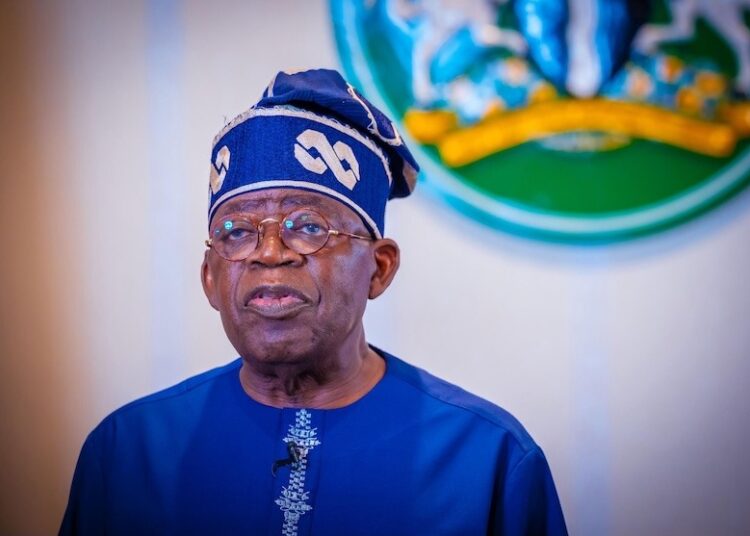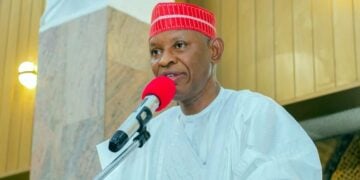For once, the guns gave way to roses.
Thursday’s decoration ceremony for the new service chiefs at the State House could have passed as one of those stiff military events where everyone looks like they swallowed a stick. Starched khaki, rigid postures, dry applause. But then, one small moment broke through all that discipline—a kiss. And not just any kiss.
Air Marshal Kevin Aneke’s wife leaned in and planted one on her husband’s lips after his decoration, right there in the council chambers, in front of President Bola Tinubu, top brass, and half the nation watching through their screens. The room erupted in laughter and applause. For a brief second, even the President cracked a smile.
Nigerians are not used to seeing affection displayed by their public figures, least of all their military ones. These are men trained to suppress emotion, not show it. The same men who salute under the rain, sleep in deserts, and keep faces carved from granite during parades. But that single kiss turned an otherwise formal event into something unexpectedly human. And maybe we needed that.
The State House ceremony had all the expected rituals—protocol officers whispering last-minute instructions, spouses in their carefully chosen traditional attire, cameras clicking nonstop. You could tell that the wives had been waiting for this moment as much as their husbands. After all, they’ve been the unseen halves of those long postings and sudden transfers, the ones who hold down homes when duty calls from a war front.
President Tinubu, after pinning those new ranks, gave his usual mix of authority and warning. “Nigerians expect results, not excuses,” he said, eyes scanning the row of freshly decorated officers. “We must smash new security threats before they fester.”
It was a sharp reminder that behind the ceremony lies a grim reality—bandits, insurgents, and restless youths testing the country’s patience. But for that one hour, the mood inside the council chambers was light. The applause, the salutes, even the laughter felt earned.
General Olufemi Oluyede, now the Chief of Defence Staff, looked every inch the composed soldier, his wife adjusting his medals with the care of someone who has probably spent years ironing creased uniforms. When the President handed him his new insignia, she smiled quietly, her expression half pride, half relief. That’s the thing about military marriages—you celebrate not only promotion but survival.
Behind her, Lieutenant General Waidi Shaibu, the new Chief of Army Staff, stood tall with his family, waving shyly at the cameras. There was a warmth in the room that you rarely see at such functions. Not the choreographed kind politicians are known for—but genuine warmth.
Then came Aneke’s turn, and the room shifted. One act of affection punctured decades of stiff military tradition. It was as if someone had opened a window to let some fresh air into the barracks.
Some will say it was “unmilitary.” Others, more cynical, will call it unnecessary drama. But in a country that has long demanded stoicism from its leaders, that small gesture was oddly refreshing. Maybe that’s the real story—how the ordinary side of our public figures, often buried under protocol and performance, slips out once in a while to remind us they are still human.
Military men are often described as tough, emotionless, and distant. Yet, their wives know a different version—the one who sneaks home at midnight from an operation, too tired to eat but too wired to sleep. The one who misses birthdays, weddings, and sometimes entire childhoods.
Aneke’s wife probably knew what that kiss symbolized more than anyone else in that room. It wasn’t about breaking decorum. It was about recognition. You can only imagine what it means to finally see your partner climb to the very top after years of service and uncertainty.
There’s something almost poetic about the contrast between Tinubu’s hard-edged speech and that tender interruption. While the President spoke about “smashing snakes before they fester,” one woman decided to show that love still finds space amid the call to arms. It’s the same paradox Nigeria lives with every day—violence and tenderness, side by side.
The President himself, for once, seemed to enjoy the break in protocol. He watched the exchange with an amused smile that softened the air in the room. For a leader who spent much of his political career surrounded by rigid formalities, it must have been a welcome sight—proof that even in uniform, humanity still leaks through.
Of course, no one will remember the exact words of the President’s charge a week from now. Speeches fade. Headlines shift. But that kiss? Nigerians will remember that. Because it cut through the noise. It reminded people that beneath those medals and titles are families, spouses, children—people who laugh, cry, and yes, occasionally defy protocol for love.
And maybe that’s what this country needs more of. A reminder that leadership doesn’t always have to wear a frown. That affection isn’t weakness. That the human side of authority can coexist with strength.
I’ve covered enough military events to know that most of them are carbon copies—march in, salute, pin rank, salute again, exit. Everyone looks tense, waiting for it to end. Thursday’s ceremony had something different. You could see it in the smiles of the spouses, in the way some of them held their partners’ hands after the medals were pinned. There was a shared relief that after all the deployments and dangers, their husbands had made it this far.
In many ways, it was the wives’ day as much as the generals’. They’ve served without rank or recognition—coordinating family relocations with each posting, attending countless officers’ wives’ meetings, holding down the fort when news from the front lines grew dark. Military spouses learn early that resilience isn’t a buzzword; it’s survival.
One could argue that the quiet strength of those women has kept the morale of our armed forces intact through years of turbulence.
When General Oluyede spoke on behalf of his colleagues after the decoration, he struck the right tone—loyal, sober, respectful. “We will do our utmost to rid Nigeria of all forms of criminality and make the country safer,” he said. The usual military promise. But his wife’s subtle nod behind him said something else—we’ve heard these vows before; now let’s hope the system lets you keep them.
Because while the ceremony was about new beginnings, Nigerians are tired of ceremonial hope. The President’s own warning—“Nigerians expect results, not excuses”—hung in the air like a drumbeat. Everyone clapped, but the applause carried a note of weariness. We’ve heard that tune before.
Still, that day belonged to the families. For once, it wasn’t just uniforms and speeches. It was people.
And maybe that’s where the soft power of moments like these lies. A military that shows emotion might not be weaker—it might actually be more trusted. In a country where citizens often see the uniform as a symbol of fear rather than protection, a little humanity goes a long way.
That kiss, in its small way, did what years of press briefings couldn’t—it made the military relatable. It said, “We are people too.”
I’ve seen soldiers cry quietly at burials, unseen by cameras. I’ve seen officers joke about their children’s school fees while waiting for flights to the front line. But those moments never make the evening news. Maybe they should. They remind us that the men and women behind those guns are fathers, mothers, sons, and daughters trying to do their duty in a country that rarely makes it easy.
There’s also something to be said about how tightly Nigeria polices public emotion. We are a culture that worships restraint, especially in leadership. Our politicians don’t hug in public; our generals don’t hold hands; our presidents rarely smile unless the cameras demand it. Every gesture is choreographed to avoid “weakness.”
That’s why the Aneke kiss hit differently. It wasn’t grand or showy. It was brief, awkward even. But it was real. And realness is rare in Nigerian public life.
Maybe we shouldn’t overthink it. Maybe it was simply a wife proud of her husband. But even so, that pride cracked something open—a glimpse of what a less rigid, more emotionally honest public life could look like.
Tinubu’s message to them was about decisiveness, about crushing threats before they spread. But maybe his bigger challenge lies in nurturing a military that also understands empathy. Because a soldier who can recognize humanity is less likely to abuse it.
By the time the ceremony ended, the families posed for pictures, wives adjusted caps, and aides fussed with microphones. Outside, the sun hit the brass badges until they glimmered. For all the talk about security and discipline, that afternoon showed another kind of strength—the one that holds homes together while the rest of the country argues politics.
We talk so much about the failures of leadership that we forget these smaller stories—the loyal partners, the quiet moments that give those at the top the strength to keep going. Maybe that’s what we should celebrate once in a while.
Because behind every decorated officer stands someone who has been through her own kind of battle, one fought in silence, far from medals or headlines. And sometimes, when the stars are finally pinned, the only fitting response is what Mrs. Aneke gave her husband—a kiss that said more than any speech could.
These are the moments that remind us our leaders are human. And perhaps that’s the first step toward making them better ones.
Sent from my iPhone





